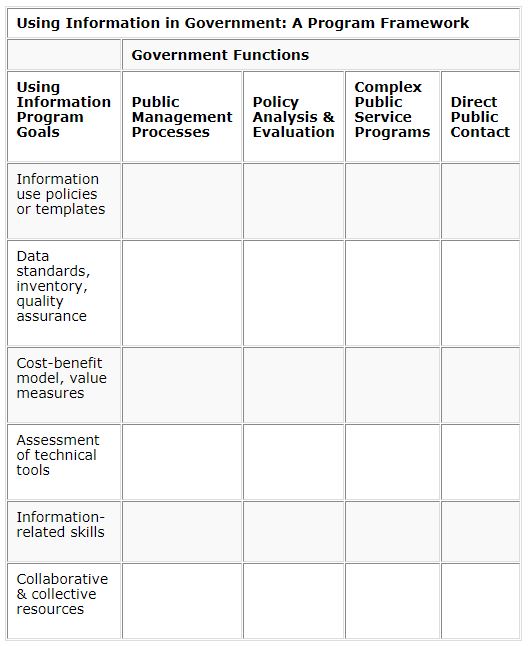Using Information in Government Program
Many people working in state and local government organizations face challenges in using information to do their jobs. They seek to use government information for program planning, monitoring, and evaluation, but struggle with a general lack of understanding of the nature and level of financial, technical, and human investments necessary to use information well.
The Center for Technology in Government led an investigation into policies, data standards, costs, skills, strategies, and technical tools associated with effective information use in the public sector. Working with seven state and local agencies on projects with varying information use issues, CTG led each project team through the project definition phase while researching the factors that influence effective information use.
The culmination of the findings are reflected in the Web-based practical resource The Insider's Guide to Using Information in Government. It presents, along with case studies from the seven projects, the management, technology, and policy issues that affected the agencies' efforts to effectively use and share information to fulfill their goals.
Scope of Work
Every day people inside government use information to develop policies, make decisions, evaluate programs and deliver services. But many face challenges in carrying out these tasks.
Issues Government Managers Face in Using Information
The Using Information in Government Program was launched when state and local program and IRM managers came together to discuss the challenges they face in using government information for planning, operations, evaluation, and decision making. The workshop established a set of goals and framework for the two-year investigation that reflected their needs and ideas for effective information use within government.
The participants identified dozens of issues they have faced in using information to do their jobs. They expressed concern in several areas including:
- a lack of understanding of the nature and level of financial, technical, and human investments necessary to use information;
- data ownership, stewardship, and related organizational issues;
- inadequate, inappropriate, and stand alone technologies and systems; and
- workforce issues including the increasing difficulty of attracting and retaining Information Technology (IT) managers and professionals to government service.
Using Information in Government Program Goals
Participants enumerated some goals and practical results they would like the Using Information in Government Program to produce. The following six program goals do not focus on a particular program area, but were considered among the top ranking concerns across all program areas.
- Recommend policies or policy templates to guide public officials in their use of government information. Comprehensive information use policies covered such topics as data collection, ownership, stewardship, intra- and inter-agency sharing and external release. Also, incorporating existing legal requirements. Data content and use policies should also be coordinated with related technology policies.
- Develop and assess data standards, inventories, and quality assurance tools. Participants noted the importance of the current data standards effort sponsored by the NYS Office for Technology, and suggested that the program develop data standards, definitions and inventories, and assess methods, costs, and benefits for creating and maintaining them.
- Develop and assess cost-benefit models and other measures of information value. Many participants were concerned that policy makers undervalue information as an organizational resource and a governmental asset. Specifically, they would like to identify mechanisms to measure and convey the value of information.
- Specify the information use skills necessary for government professionals and recommend ways to acquire them. Participants were concerned about the lack of skills necessary to effectively use government information, including ability to search, assess, analyze, and present information. They suggested a program goal of defining information-related competencies for program staff and research and IT professionals, as well as recommending education and hiring strategies.
- Assess the cost-effectiveness of various technical tools and techniques. Many information management tools are in use, or are under development in government and business. The program should explore the feasibility, cost-effectiveness, and appropriateness of various tools, such as databases, query tools, data warehouses, data marts, and data mining, for diverse business objectives.
- Develop collaborative and collective resources for data users. Participants identified several techniques to assist in achieving this goal, including a Web site which provides tools, tips, techniques, and contacts for those engaging in many kinds of data projects. In addition, a set of recommended practices based on real public sector experiences that address the policy, management, and technology issues to consider.
A Using Information in Government Program Framework
Most government program managers think of information services as tools to support both internal functions and a wide array of services to the public. These functions and services can be usefully divided into four areas: public management processes, policy analysis and evaluation, complex public service programs, and direct public contact. Each of these has different decision-making requirements, and therefore different information content and service requirements. We characterize them as follows:
Public management processes include internal controls, procurement, personnel management, rule-making, records management, auditing, and financial management.
Policy analysis and evaluation covers such functions as research, planning, program development, evaluation, and reporting.
Complex public service programs involves professional staff from one or more agencies in extensive service delivery, regulatory, or enforcement activities.
Direct public contact includes publicly accessible information, referral services and directories; direct public access to reports and information; public participation processes; freedom of information requests; and simple transactions such as license and registration renewals or payment of fees and fines.
The conceptual framework for the Using Information in Government Program, shown below, reflects both this array of governmental functions and the list of program goals described earlier. The Program addresses not only one or a few cells in this framework but represents experiences and lessons across the full range of possibilities.

Press Releases & News Stories
Press Releases
- Meet the New York State Office of Temporary and Disability Assistance (OTDA)
- Center for Technology in Government Wraps Up Two-year Project: Using Information in Government Program Involved Seven State and Local Agencies
- Improving the Information Resources that Hold Government Together
- Center for Technology in Government Announces Four New Projects: Using Information in Government Focus of Work with State/Local Agencies
- Center for Technology in Government Hosts Seminar on How to Use Information: Session Features Tools, Skills, and Cases Designed to Help Public Managers
- Center for Technology in Government Hosts Seminar on "Dealing with Data:" Half-Day Session Highlights Tools for Information Resource Managers
Publications & Results
Reports
- Insider's Guide to Using Information in Government Executive Briefing
- New York State Central Accounting System Stakeholder Needs Analysis
- Reassessing New York: A Collaborative Process
- Putting Information Together
- What Rules Govern the Use of Information?
- Building Integrated Data Repositories
- Research and Practical Experiences in the Use of Multiple Data Sources for Enterprise Level Planning and Decision Making: A Literature Review
- Web-based Applications and/or Networked Legacy Systems
- Dealing with Data
- Data Quality Tools for Data Warehousing - A Small Sample Survey
Public Events (4)
Using Information in Government Seminar Series
February 1999 - February 2000
- Dealing with Data
February 1999
https://www.ctg.albany.edu/publications/dealing_with_data - Building Integrated Data Repositories
May 1999
https://www.ctg.albany.edu/publications/building - What Rules Govern the Use of Information
October 1999
https://www.ctg.albany.edu/publications/what_rules_govern - Putting Information Together
February 2000
https://www.ctg.albany.edu/publications/putting_info
Partners
Government Partners
- Central New York Psychiatric Center
- New York State Archives and Records Administration
- New York State Department of Transportation
- New York State Office of Real Property Services
- New York State Office of the State Comptroller, Central Accounting System,
- New York State Office of the Comptroller, Division of Municipal Affairs,
- New York City Department of Information Technology and Telecommunications
Academic Partners
- David Andersen, Distinguished Service Professor, Department of Public Administration and Policy, Rockefeller College of Public Affairs and Policy, University at Albany, SUNY
- Lakshmi Mohan, Associate Professor, Management Science and Information Systems Program, School of Business, University at Albany, SUNY
- Giri Tayi, Professor, Department of Management Science and Information Systems, School of Business, University at Albany, SUNY
Center for Technology in Government
- Darshana Apte, Graduate Assistance
- Donna Berlin, Internet Coordinator
- Peter A. Bloniarz, Director of Program Development
- Donna Canestraro, Project Support Manager
- David Connelly, Public Administration
- Meghan Cook, Project Associate
- Tony Cresswell, Research Director
- Sharon Dawes, Director
- Ophelia Eglene, Graduate Assistant
- Winsome Foderingham-Williams, Education Coordinator
- Sally Goodall, Publications Manager
- Linda Keane, Secretary
- Kristine Kelly, Manager, Project Research
- Jane Krumm-Schwan, Administration & Outreach Director
- Mark LaVigne, Project Associate
- C.N. Le, Research Associate
- Carol Murray, Secretary
- Shrilata Nath, Manager, Project Associate
- Pam Neely, Graduate Assistant
- Theresa Pardo, Project Director
- Carrie Schneider, Graduate Assistant
- Jochen Scholl, Project Support Manager
- Stephanie Simon, Information Coordinator
- Fiona Thompson, Research Associate
- Derek Werthmuller, Director of Technology Services
- Jihong Zeng, Graduate Assistant
- Jing Zhang, Graduate Assistant
